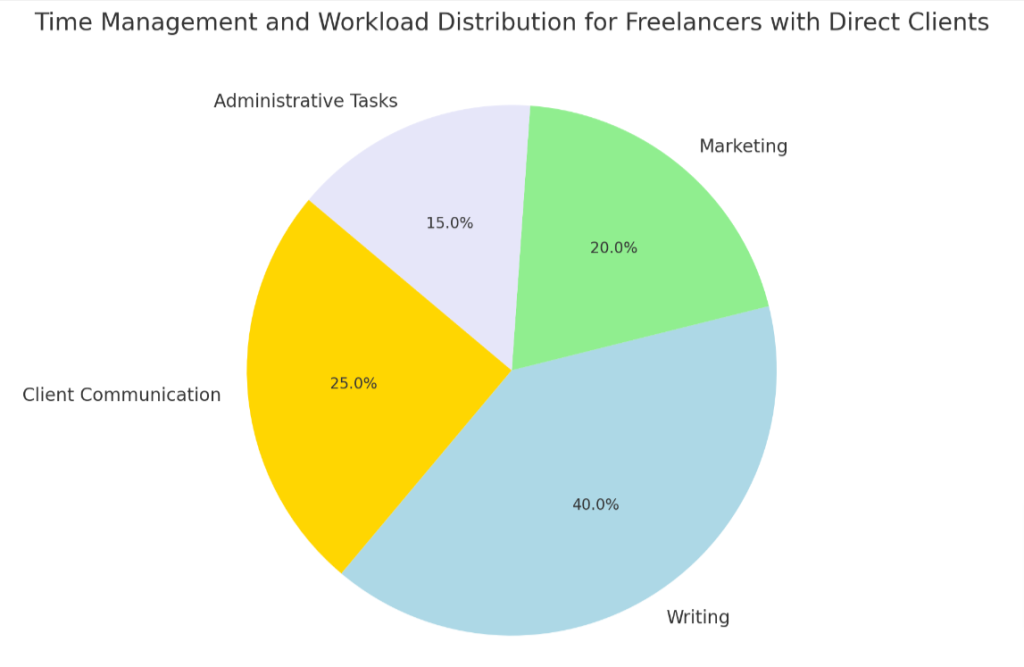Direct Clients in Freelancing: Advantages and Challenges
Are you pondering the benefits and drawbacks of writing for direct clients as a freelancer? It’s a widely known fact that this path in the writing industry has its own set of unique advantages and challenges.
Our comprehensive article will guide you through the pros and cons, offering much-needed clarity to make an informed decision. Intrigued? Keep reading, there’s more!
Key Takeaways
- Writing for direct clients as a freelance writer offers independence, schedule flexibility, higher earning potential through rate negotiation, and opportunities for long-term relationships and professional growth.
- However, there are also challenges such as irregular income, lack of employee benefits like health insurance and paid leave, the time-consuming process of finding new clients, high competition for projects, tough negotiations without agency support, the risk of non-payment or dealing with difficult clients.
- Factors to consider when choosing between agencies and direct clients include steady income vs. unpredictable income, employee benefits vs. no employee benefits, set hours vs. flexible schedule, one job vs. many jobs and area of opportunity/location.
Pros and Cons of Writing for Direct Clients
Writing for direct clients has its advantages and disadvantages that freelancers should consider before making a decision.
Pros of Direct Clients
Engaging with direct clients as a freelance writer presents numerous advantages.
- Independence is one big advantage; you have control over the projects to take up and the ones to turn down.
- You enjoy schedule flexibility, often working at your own pace, without being tied down to a traditional 9-to-5 job.
- The chance for higher earnings is also possible since you negotiate your rates directly with clients.
- Building a varied portfolio becomes easier because of exposure to diverse writing projects across different industries.
- The opportunity for long – term relationships increases, leading to steady work through repeat clients.
- Direct feedback from clients aids in honing your craft and improving writing skills over time.
- In terms of professional growth, direct client engagements provide an avenue for industry – specific skill development, letting you become an expert in chosen niches.
Cons of Direct Clients
Navigating the world of direct clients as a freelance writer presents challenges alongside its benefits. Here are some cons to be aware of:
- Irregular Income: Unlike agency work that guarantees a stable income, direct clients may offer unpredictable pay.
- No Employee Benefits: Freelancers working with direct clients often miss out on perks like health insurance or paid leave, which are common in traditional employment.
- Time-Consuming Client Hunt: Finding new clients can take time and energy away from actual writing tasks.
- High Competition: Freelancers face fierce competition for high-paying direct client projects, especially from established writers.
- Tough Negotiations: It may be difficult to negotiate fair pay rates and contract terms without the backing of an agency.
- Risk of Non-Payment: There’s always a risk that clients may delay or default on payment for services rendered.
- Dealing with Difficult Clients: Some clients might have unrealistic expectations or poor communication skills, making the working relationship challenging.
- Lack of Feedback Structure: Direct clients might not provide constructive feedback on your work, limiting opportunities for growth and improvement.
- Varied Workload: You may experience periods of intense workload followed by times where very little work is available, leading to stress and inconsistency.
- Limited Scope for Professional Networking: Working directly with clients can limit networking opportunities compared to working within an agency structure.
Factors to Consider When Choosing Between Agencies and Direct Clients
Consider factors such as steady income vs. unpredictable income, employee benefits vs. no employee benefits, set hours vs. flexible schedule, one job vs. many jobs, and area of opportunity/location when deciding between agencies and direct clients.
Steady income vs. unpredictable income
Freelance writing for direct clients presents a unique situation when it comes to income stability. This is often considered as steady income vs. unpredictable income.
| Steady Income | Unpredictable Income |
|---|---|
| Employees of an agency typically have a steady income with regular paychecks. | Income for freelance writers working with direct clients can be unpredictable and vary greatly from month to month. |
| The stability of steady income helps in planning finances with more certainty. | Unpredictable income makes it challenging to plan for expenses and savings. |
| It might come with less potential for high income as pay scales are often fixed. | There’s potential for high income if a freelancer can secure high-paying clients and manage time effectively. |
| There’s less worry about finding new clients or chasing payments. | Freelancers often have to continuously find new clients and may face delays in payments. |
Employee benefits vs. no employee benefits
Choosing between writing for an agency versus writing for direct clients often boils down to the kind of benefits one can avail. Agency employees usually get to enjoy certain benefits that freelancers do not.
| Scenario | Agency Writer | Freelance Writer |
|---|---|---|
| Health Insurance | Agencies commonly offer health insurance covers as part of employee perks. | Freelancers working with direct clients usually need to arrange for their own health insurance. |
| Retirement Benefits | Many agencies offer retirement plans like 401(k) contributions, aiding the financial security of their employees. | Freelancers are generally responsible for their own retirement savings and plans. |
| Paid Leave | Agency writers often have paid annual leaves or sick leaves, ensuring income regardless of their personal circumstances. | Freelancers have the flexibility of taking off when they want, but it usually comes without pay. |
| Professional Development | Agencies often provide learning opportunities or reimbursements for workshops and courses, aiding in career development. | Freelancers have to invest in their professional development from their pocket. |
The choice between being an agency writer and a freelance writer, therefore, is a matter of preference and depends on an individual’s financial situation, career goals, and personal needs.
Set hours vs. flexible schedule
When you work for a writing agency, you usually have set hours, but when you work for direct clients, your schedule can be more flexible.
| Set Hours | Flexible Schedule |
|---|---|
| You are expected to adhere to a strict work schedule. | You have the freedom to decide when you want to work. |
| May not be suitable for writers who have commitments during typical business hours. | Great for writers who need to balance work with personal life or other commitments. |
| Requires continuous availability during set hours, which can limit creativity. | Allows for work during peak creative times, enhancing productivity and work quality. |
| Set hours may not always align with the global time zones of clients. | Flexible schedule allows for aligning with the client’s time zone for better communication. |
Having a set work schedule can provide structure and predictability, but it might also limit your freedom and creativity. A flexible schedule, on the other hand, can allow you to work during your most productive hours, but it requires careful time management. It’s essential to consider these factors when deciding between working for an agency or direct clients as a freelance writer.
One job vs. many jobs
Writing for direct clients often means taking on multiple jobs simultaneously. This can be both an advantage and a challenge. On the one hand, having many different writing projects allows you to diversify your skills and knowledge across various industries or niches. It keeps things interesting and helps you develop expertise in different areas.
On the other hand, managing multiple jobs requires effective time management and organization skills to ensure that you meet all deadlines without compromising the quality of your work. So while having many jobs as a freelance writer can offer exciting opportunities, it also comes with the responsibility of balancing your workload effectively.
Area of opportunity/location
Area of opportunity/location plays a significant role when it comes to writing for direct clients. The beauty of freelance writing is that you have the freedom to work from anywhere, whether it’s your home office or a cozy coffee shop.
Writing for direct clients opens doors to diverse projects worldwide, allowing you to explore different industries and expand your skillset. It also means that you can tap into global markets and potentially earn higher earnings compared to working with local agencies.
So, if flexibility and the chance to work on exciting projects from any location appeals to you, then writing for direct clients might be the perfect fit.
Tips for Successful Freelance Writing for Direct Clients
Clearly outline expectations, build a strong portfolio, consistently deliver high-quality work, communicate effectively with clients, and manage time and workload effectively.
Clearly outlining expectations
When writing for direct clients as a freelancer, it is crucial to clearly outline expectations from the start. This means having open and transparent communication with your client about project requirements, deadlines, deliverables, and any other important details.
By doing so, both parties are on the same page and there is less room for misunderstandings or disappointments later on. Clearly outlining expectations also helps you manage your time and workload effectively, ensuring that you can meet your client’s needs while maintaining a healthy work-life balance.
Moreover, it sets a professional tone for the working relationship and demonstrates your commitment to delivering high-quality work.
Building a strong portfolio
Building a strong portfolio is essential for freelance writers working with direct clients. By showcasing a diverse range of writing projects in their portfolio, writers can demonstrate their skills and expertise to potential clients.
It allows them to highlight their ability to write different types of content, such as articles, blog posts, web copy, or marketing materials. A strong portfolio also helps writers establish credibility and trust with clients by showing examples of their past work and the positive results they have achieved.
This can lead to more opportunities for freelance writers and help them attract higher-paying clients in the future. Additionally, having a solid portfolio gives writers a competitive edge in the market as it sets them apart from other freelancers who may not have as extensive or impressive a body of work.
Consistently delivering high-quality work
Consistently delivering high-quality work is essential when writing for direct clients. Your reputation as a freelance writer depends on your ability to consistently produce content that meets or exceeds client expectations.
By maintaining a high standard of quality, you’ll increase the likelihood of repeat business and referrals from satisfied clients. To achieve this, it’s important to thoroughly research and understand the topic before writing, conduct thorough proofreading and editing, and communicate effectively with clients to ensure their needs are met.
Additionally, staying updated with industry trends and continuously improving your skills will help you deliver top-notch work that stands out in a competitive market.

Communicating effectively with clients
Communicating effectively with clients is vital for freelance writers working directly with clients. It is essential to have strong communication skills in order to understand client requirements, ask clarifying questions, and ensure that the final deliverables meet their expectations.
Clear and open communication promotes a positive working relationship with clients, fosters trust, and helps avoid any misinterpretations or misunderstandings. By actively listening and responding promptly to client feedback and inquiries, freelance writers can build rapport and enhance their reputation as reliable professionals in the industry.
Managing time and workload effectively
Managing time and workload effectively is crucial for freelance writers who work with direct clients. With the freedom to choose your own projects and clients, it becomes even more important to stay organized and prioritize tasks.
By creating a schedule or using productivity tools, you can allocate dedicated time slots for each project or task. This helps in avoiding procrastination and ensures that you meet deadlines.
It is also helpful to break down larger tasks into smaller, manageable chunks so that you can progress steadily. Regularly reviewing your workload and adjusting your schedule as needed will help you maintain a healthy work-life balance while delivering high-quality work to your clients.
Conclusion
In conclusion, writing for direct clients offers the freedom and autonomy to choose projects and work on your own terms. It also allows for direct communication with clients, the opportunity to negotiate payment terms, and receive valuable feedback.
However, it is important to consider the competitive market and the need to consistently deliver high-quality work in order to succeed as a freelance writer.

